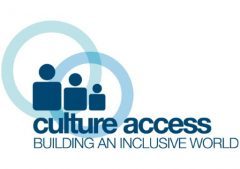Culture Access CIC is about supporting access, diversity and inclusion with an intersectional approach.
Culture Access was created in our enthusiasm for an access to activities which we roughly categorise under culture – with a small ‘c’ – that which is not sports, campaigning or on the impact of cuts. We are focusing on disabled access but not exclusively so.
We discuss access to alternative culture – to other than those mainstream activities that we find ourselves excluded from, like ethnic food, music events and outdoor activities. We are also wanting to build a community.
We include financial / economic access – we are looking for activities which are affordable.
We would focus on access to culture not just as consumers but also as practitioners.
Current Projects
Pan impairment co designed art work
Greenwich Disabled People’s Innovation Project
Cooking with Help
Previous events
Being Black and Disabled: Intersections for Black History Month
Being Disabled and People of Colour : Intersections for Disability History Month
Disabled and Proud Festival
The Right to Culture
(from UNESCO The Right to (access) Culture)
Article 27 of the Universal Declaration of Human Rights states that “everyone has the right freely to participate in the cultural life of the community, to enjoy the arts and to share in scientific advancement and its benefits.”Cultural rights are, therefore, inseparable from human rights, as recognized in Article 5 of the 2001 UNESCO Declaration on Cultural Diversity, and can be defined as theright of access to, participation inand enjoyment ofculture. This includes the right of individuals and communities to know, understand, visit, make use of, maintain, exchange and develop cultural heritageand cultural expressions, as well as to benefit from the cultural heritage and cultural expressionsof others. Other human rights, such as the rights to freedom of expression, the right to information and the right to education, are key to the realization of cultural rights. However, varyingdegrees of cultural rightsmay be recognized,as cultural rights cannot be used as a justification to limit other human rights enshrined in international law
Culture is fundamental to human dignity and identity. Understanding the link between cultural rights and human rights is therefore essential to the safeguarding and promotion of culture, as well as the rights of people. Cultural rights force us to take into account the rights ofindividuals and communities in relation to culture and, in particular, to connect cultural heritage and expressions with the people who produce them. Accessing and enjoying culture is an important partof being a citizen, a member of a communityand, morewidely, a member of society. At a time when artists, cultural minorities, cultural heritage and cultural expressions are increasingly under attack, defending the cultural rights of individuals and communities has never been more important.

